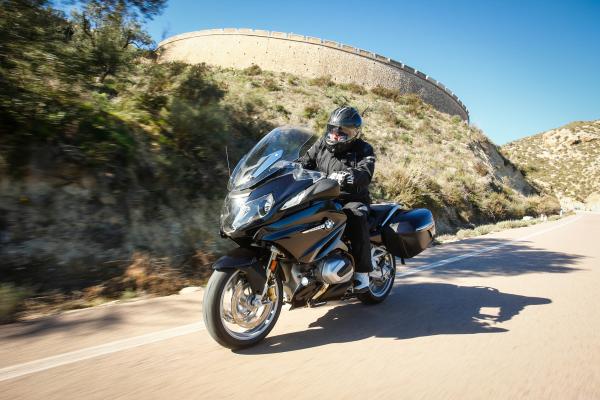
Mid-heavyweight touring Boxer gets the ShiftCam treatment
THE ULTRA touring bike class used to be a fairly simple place. You had yer full-dress tourers like the Honda Gold Wing, the Harley-Davidson Electra Glide Ultra Tour Classic, and the BMW K1200 LT. There were other weird beasts in the US market, but that was broadly that. Then, a notch down came the likes of the Honda Pan European, Yamaha’s FJR1300 and BMW’s big Boxer tourers, and finally, the smaller, more nimble sport tourers: Honda VFR, Triumph Sprint, Ducati ST4.
The adventure market has kicked all this into touch of course. Folk who would go for a sports-tourer or light heavyweight like the Pan European now generally plump for a big traillie – a Triumph Tiger, a Kawasaki Versys, maybe a KTM. Meanwhile, the ultra-tourer class has fractured too – BMW’s LT tourer is now a gigantic inline six – the K1600LT, while the latest Gold Wing has actually got a bit smaller and more Pan-European like. What does it all mean?
BMW’s kept to the script with its Boxer tourer though – the RT. We’re in Spain for a spin on the latest R1250 version, but the RT’s roots go back to the R100 RT of the 1970s. A big old fairing and luxury accommodation for two, with a decent turn of speed, has been the recipe, and while the RT hasn’t always been BMW’s most glamorous or popular machine, it’s outlived many of its rivals.
As with the R1250 GS Adventure I’m also riding today, the main story on the RT is the new engine. The ShiftCam technology adds variable lift and duration to the inlet cam via a cunning sliding camshaft setup, and that, plus an extra 84cc capacity, gives much more torque throughout the rev range, and a decent top-end power boost too. We imagine it’s there to help with emissions regs in some way as well, but who cares about that? Not me. It’s a lovely sunny day, the frozen wastes of Blighty in December are a distant memory, and I’ve got a day blatting round the Andalucian asphalt on the RT and the GS Adventure.
As ever these days, the initial introduction to the RT is all about the tech. I spend a good 15 minutes attempting to link my phone to the powerful onboard audio system via Bluetooth, or USB, with no success. It’s not the end of the world – I have my own Bluetooth headset and Ultimate Earphones, plus an Ultimate Addons phone holder, so I’m independently sorted for tunes and navs. It’s a shame I’m not getting to treat the locals to my eclectic selection of shit music though. Gah. It takes me a while to find the traction control settings as well, so it’s probably fair to say the dash and its interface is less idiot-proof than it could be. Never mind – let’s go for a ride, eh?
The RT is a big old bus of course, tipping the scales at 279kg fuelled-up. But the low-down mass of the engine, plus the Telever front suspension does a good job of disguising the mass. Slow-speed work heading out of town is impressive, with a natural steering feel and agile handling, plus a new Hillstart function as standard. This holds the brakes on when you give the lever an extra tug, stopping you rolling back on hills, and automatically releasing when you pull away again. It works well, with a little indicator in the clocks showing when you’re locked up, and is another little thing to make life easier in day-to-day riding.
Once things speed up (on an RT today, you have to work harder to keep up with the loons on the GS Adventures) you’re still impressed. Metzeler Z8 rubber is a good choice, with solid grip and plenty of feedback, there’s more than enough ground clearance (not always the case with this type of bike), and the new Hayes brake calipers cope well with all that mass and speed. Telelever makes as much sense at higher speeds on a big bike like this, and with the electric screen adjusted for the perfect blend of protection and airflow past my lid, I’m having a ball chasing the pack of GSAs up ahead.
It’s the engine which gains most attention though. As on the GSA, its extra chunks of torque all over the rev range give a real buzz to proceedings, and the RT feels far livelier than you’d expect from a bike with a stereo. Once you work out how to switch off the traction (harder than usual on a Beemer), it wheelies like a good ‘un too – certainly on par with heavyweight mono-champs from the past like Honda’s Pan European – and you can, generally, take the piss everywhere you’d like to.
After a morning coffee break, I have another run on the RT, and this time take it a little easier. It’s fair to say most folk will be buying this bike for its luxury accommodation and smooth progress rather than its wheelie skillz – and it’s a treat when you’re going slowly too. I tune the radio into a classical music channel, bump the riding modes down a notch, and waft along, enjoying the Andalucian atmosphere. A big old 25 litre fuel tank, decent fuel consumption and masses of mod cons makes the RT an easy place to be for the long run – even if I’m not really needing the heated seat and grips today.
So – the new RT has a great new engine, loads of toys, and continent-crushingly comfort. It’s got the skillz to go nuts now and again too, and with the quirky front headlight array, classy paint finish and high-quality metalwork everywhere, it looks the part too. The base model starts around £14,400, but you’ll want to go for one of the posh versions with more trick kit bolted on. Sick of the adventure-bike scene and wanting to go back to big-bore touring basics? The new R1250 RT could make your next buying decision very simple indeed…
SPECS
Engine: 8v boxer flat twin, DOHC, variable valves, liquid cooled, 1,254cc
Bore x stroke: 102.5x76mm
Compression ratio: 12.5:1
Max power (measured at tyre) 136bhp@7,750rpm
Max Torque (measured at tyre) 106ft lb@6,250rpm
Transmission: six speed gearbox, wet slipper clutch, shaft drive
Frame: two-part subframes, engine as stressed-member
Front suspension: BMW Telelever monoshock, 37mm stanchions, electronic suspension adjust option
Rear suspension: Paralever single-sided swingarm, monoshock, fully adjustable, electronic adjust option
Brakes: Dual 320mm discs, four-piston Hayes calipers (front), 276mm disc, twin-piston Brembo caliper (rear), Motorrad ABS, optional ABS Pro
Wheels/tyres: Cast aluminium/Metzeler Z8, 120/70 17 front, 180/55 17 rear
Rake/trail: 25.9°/116mm
Wheelbase: 1,485mm
Kerb weight (fully fueled): 279kg
Fuel capacity: 25 litres
Rider Aids: BMW ABS, traction control, rider power modes, hill start assist. Optional electronic suspension, ABS Pro, Pro riding modes, Shift Assist pro.
